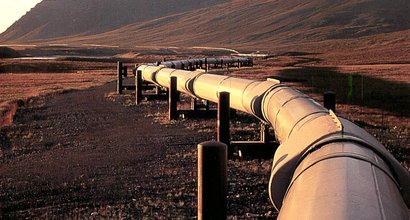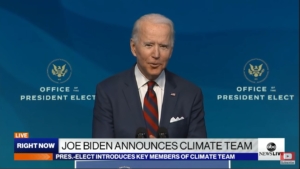What’s on TAP for Energy in a Trump Administration?
During his campaign, President-elect Donald Trump was consistently vociferous in advocating for expanding domestic energy production by removing regulations, while calling for more private investment in oil, coal, and natural gas. And so far, most of Trump’s cabinet nominees align themselves with this mantra. But, market and political forces outside of anyone’s control could be the primary drivers behind changes in the energy sector. And, one may find a few surprises among the incoming administration’s personnel that run against conventional wisdom.
Here are four things to watch as the Trump administration begins to turn personnel into policy:
Trump’s Pro-Gas Policy Will Undermine His Pro-Coal Policy: With 50,000 coal-related jobs lost since 2008, Trump has pledged to revitalize the coal industry by removing environmental regulations implemented by the Obama administration. Oklahoma Attorney General Scott Pruitt, currently suing the EPA over carbon emission regulations, is slated to be the new EPA Administrator. And, Interior Secretary nominee Ryan Zinke is expected to allow new coal leases on federal lands in an effort to revitalize the industry. But, Zinke could also put up roadblocks as he has been a fierce advocate for public lands, opposing GOP orthodoxy on transferring federal property to states. The overwhelming factor that may drive the outlook of the coal industry is how much more it suffers from competition from natural gas with the rise of fracking, another key element of the incoming administration’s path to expand domestic energy production. The market’s preference for gas over coal could mean the incoming administration’s pro-gas policies will likely undermine their pro-coal policies.
Subscribe to Receive Insights
"*" indicates required fields
For Renewables, The More Things Change, The More They Stay The Same: Conventional wisdom claims the President-elect’s policies will severely hurt renewable fuel industries. Yet, former Texas Governor Rick Perry, Trump’s nominee for Secretary of Energy, has been a strong promoter of renewable energy, overseeing massive investments into wind power in Texas by maintaining limited regulations. Perry also supported federal subsidies for wind producers, a position in stark contrast to the President-elect’s general opposition to tax breaks and ‘crony capitalism’ for renewable energy. Yet, the President-elect has voiced support for the Renewable Fuel Standard during the campaign. This sets up a potential fight involving large portions in the fossil fuel industry who oppose the RFS in its current form and have several allies within the new administration.
Pipelines Can Count On FERC Under Trump …: Pipeline construction and energy infrastructure investments are where we’re most likely to see a complete 180-degree flip in policy from Obama to Trump. The President-elect has made several statements indicating interest in approving existing pipelines – such as the Dakota Access Pipeline – and reopening negotiations on constructing the Keystone XL pipeline. Who the President-elect names to the Federal Energy Regulatory Commission (FERC) – the quasi-judicial body that is often the first federal-level stop for public hearings for pipeline projects – as well as the officials within the Interior and Army Departments (especially the Corps of Engineers) will be critical. By rule, FERC has three commissioners from the President’s party and two from the opposing party. The five-member commission currently has two vacancies, with all three remaining panel members being Democrats, one whose term ends on June 30 of this year. By this summer, Trump can deliver Republican control and a Republican chairman to FERC. At Delve, we’ve been following potential nominees to FERC as part of The Administration Project, a service we launched after the election to help companies and causes understand the policy implications of the incoming administration. While no names have officially been announced, candidates being floated to lead the bipartisan commission are either experienced energy executives (such as Janet Sena) or oil company lobbyists (such as Shannon Banaga), all likely to produce candidates who will support the President-elect’s call for advancing energy infrastructure projects.
… But They Can’t Count On State And Local Governments: Green groups that have protested pipeline projects in the past don’t necessarily have to engage the federal government to achieve their goals of stopping or delaying construction. Projects being pursued across the country – including the Atlantic Coast and Mountain Valley pipelines in Virginia, Enbridge’s Line 5 pipeline expansion in Michigan, the Valley Lateral Pipeline project in New York, and the Sabal Trail Pipeline project in Florida, Georgia, and Alabama – could be subject to objection from local and state government agencies that are friendlier to the environmental left. Just because energy infrastructure companies now have a friend in the White House doesn’t mean all roadblocks to pipeline construction will be cleared; environmental opposition will only be louder and they will put the “think global, act local” mantra into action.
Yucca Could Trip Up Trump’s Other Nuclear Agenda: Much of the Department of Energy’s functions are focused on maintaining and regulating nuclear power across the country. President-elect Trump has made several comments referring to his intention to strengthen and upgrade America’s nuclear power capabilities, a task which would fall to DOE to execute. However, the President-elect also has also applied the caveat that nuclear power not be supported through carve-outs in the tax code, presenting a challenge to operators of nuclear power plants who claim they rely on subsidies to maintain their functionality. But, current public opinion of nuclear power and the issue of how to address nuclear waste has not been conducive to, and will continue to be a roadblock in creating a safe space for the industry. The Obama administration’s unwillingness to proceed with waste storage facilities such as Yucca Mountain was unsurprising. But, Perry has also voiced opposition to the proposed Nevada nuclear waste repository during the 2012 Republican presidential primary, a position that may further stall any efforts.
Personnel will undoubtedly drive debate, details, and decision-making on policy within the Trump administration when it comes to different fuel sources. It’s how that policy interacts with or reacts to market forces and political dynamics that will shape the future of energy production, transportation, and generation. The Administration Project at Delve can help you understand the who, what, and when of the incoming administration and provide those important insights at the intersection of business and policymaking, whether it’s a cause you’re supporting or a bottom line you’re protecting. To learn more, click here.
Jeff Berkowitz is the Founder and CEO of Delve, a Washington-based competitive intelligence and issue management firm helping companies and causes achieve and leverage an information advantage in overcoming their policy, political, and business challenges. He formerly oversaw research and messaging operations for The White House, U.S. Department of State, Republican National Committee, and the George W. Bush and Rudy Giuliani presidential campaigns.



